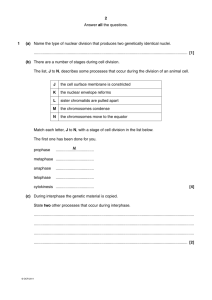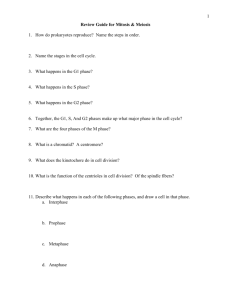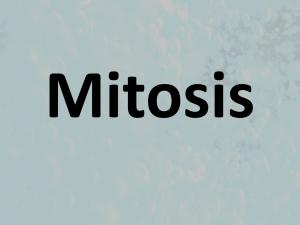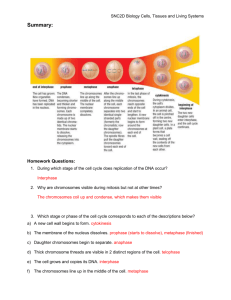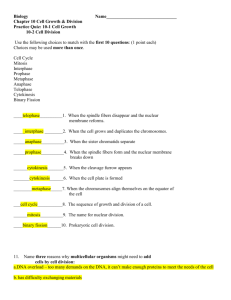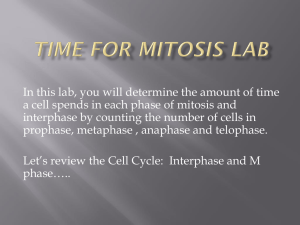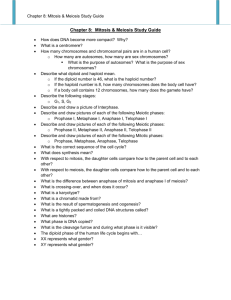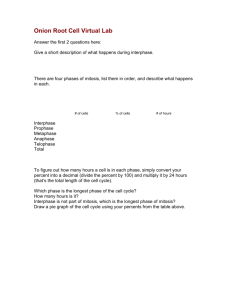File
advertisement
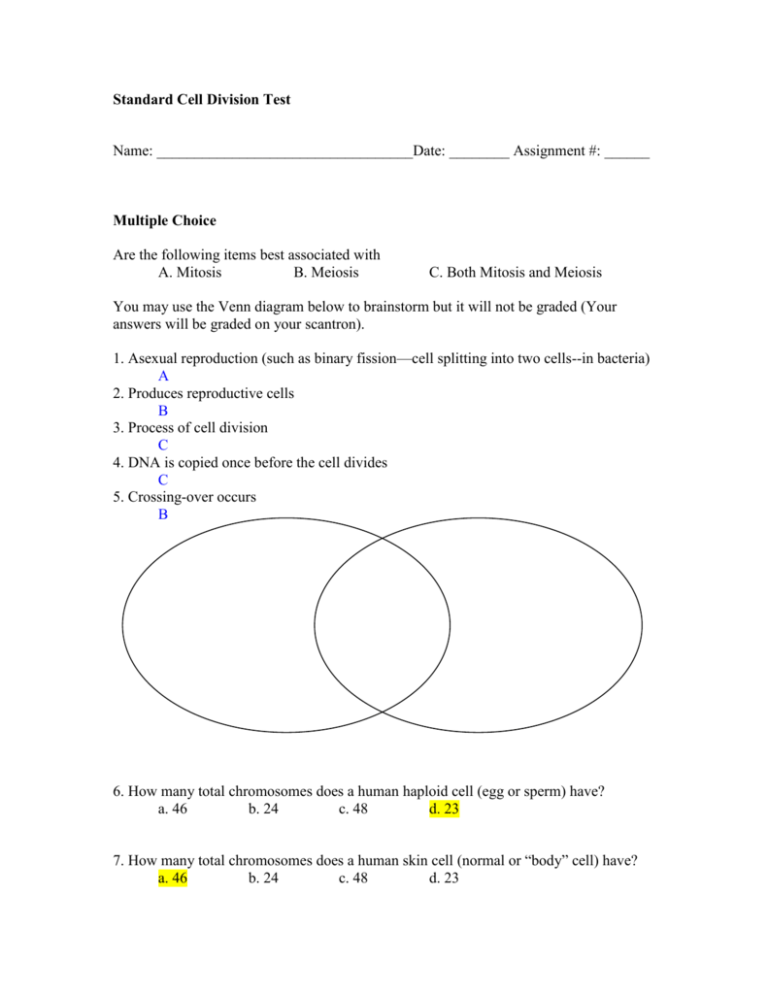
Standard Cell Division Test Name: __________________________________Date: ________ Assignment #: ______ Multiple Choice Are the following items best associated with A. Mitosis B. Meiosis C. Both Mitosis and Meiosis You may use the Venn diagram below to brainstorm but it will not be graded (Your answers will be graded on your scantron). 1. Asexual reproduction (such as binary fission—cell splitting into two cells--in bacteria) A 2. Produces reproductive cells B 3. Process of cell division C 4. DNA is copied once before the cell divides C 5. Crossing-over occurs B 6. How many total chromosomes does a human haploid cell (egg or sperm) have? a. 46 b. 24 c. 48 d. 23 7. How many total chromosomes does a human skin cell (normal or “body” cell) have? a. 46 b. 24 c. 48 d. 23 8. The Virginia state bat is the big-eared bat (Plecotus rafenesquii). If the big-eared bat’s diploid cells have 32 chromosomes, how many chromosomes will a big-eared bat’s egg cell have? a. 32 b. 36 c. 16 d. 18 9. When does crossing-over occur? a. Prophase I of meiosis b. metaphase of mitosis b. Metaphase II of meiosis c. interphase of mitosis 10. Mitosis starts with _________ cell(s), and ends up with _______ cell(s). a. 1; 2 b. 2; 2 c. 2; 4 d. 1; 4 11. Meiosis starts with _________ cell(s), and ends up with _______ cell(s). a. 1; 2 b. 2; 2 c. 2; 4 d. 1; 4 12. In mitosis, the daughter cells are ________, and in meiosis they are ___________. a. identical; different c. different; identical b. identical; identical d. different; different Label the following structures on the diagrams (13-17). a. Spindle fibers17 d. Nuclear envelope14 b. Sister chromatids15 e. metaphase plate16 c. chromatin13 Label the following structures on the diagram (18-20) a.chromosomes18 b. cleavage furrow20 c. centrosomes19 13 13 16 14 15 17 19 18 20 21. What is the correct order of the MITOSIS (cell division) stages? a. Prophase, Metaphase, Anaphase, Telophase b. Interphase, Prophase, Metaphase, Anaphase, Telophase c. Telophase, Interphase, Metaphase, Anaphase d. Prophase, Telophase, Anaphase, Metaphase, Interphase 22. Choose the correct order of MEIOSIS stages. a. Prophase, Metaphase, Anaphase, Telophase b. Prophase I, Metaphase I, Anaphase I, Telophase I, Prophase II, Metaphase II, Anaphase II, Telophase II c. Interphase I, Prophase II, Metaphase III, Anaphase IV, Telophase V 23. Which of the following is NOT a haploid cell? a. reproductive cell b. sex cell c. gamete d. stem cell 24. Interphase is _____________________ cell divisions. a. before b. after c. in between Choose the correct stage of Interphase for each event a. G1 b. GO c. S d. G2 25. Resting phaseB 26. Editing phase (for DNA)D 27. DNA is copiedC 28. Cell contents are doubled (cell growth)A Choose the correct stage a. Prophase b. Metaphase 29 Anaphase c. Telophase 30 d. Anaphase 31 Prophase 32 Telophase Write the correct phase for each event below. Your choices are (they are NOT in order!): a. Metaphase b. Interphase c. Telophase d. Anaphase e. Prophase 33. C cell splits 34. D spindle fibers shorten & pull chromatids apart 35. E spindle fibers form 36. E _nuclear envelope disappears 37. E_chromatin condenses into chromosomes 38. A chromosomes line up on metaphase plate (in the middle of the cell) 39. _Cspindle fibers disappear Metaphase 40. C chromosomes disperse (or loosen up) 41-44. Describe the purpose of Mitosis. Give at least two reasons why it is important and be specific! 4 points. The purpose of mitosis is to create, new identical cells. This can be for cell replacement and growth. Unicellular organisms can also divide, or reproduce this way. 45-46. Describe the purpose of meiosis. Be as specific as possible. To create 4 unique reproductive cells for sexual reproduction. 47-48. What happens during crossing-over, and what does it contribute to the new cells? (This is also the ADVANTAGE we discussed of sexual reproduction). Two homologous chromosomes exchange genetic information. This adds genetic diversity. 49-50. WHY do reproductive cells need to have HALF the amount of genetic information as “regular” cells? Hint—Think of what happens during fertilization. So two reproductive cells can come together during fertilization and create a new organism with the correct number of chromosomes. Bonus Questions. 1. How is cancer related to the cell cycle? 2. What is a stem cell? 3. What are the similarities and differences between chromatin, chromatids & chromosomes? 4. What is a zygote? Worth 2 points.
